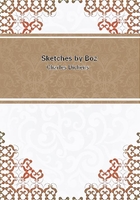
第83章
THE PAWNBROKER'S SHOP
Of the numerous receptacles for misery and distress with which the streets of London unhappily abound, there are, perhaps, none which present such striking scenes as the pawnbrokers' shops. The very nature and description of these places occasions their being but little known, except to the unfortunate beings whose profligacy or misfortune drives them to seek the temporary relief they offer.
The subject may appear, at first sight, to be anything but an inviting one, but we venture on it nevertheless, in the hope that, as far as the limits of our present paper are concerned, it will present nothing to disgust even the most fastidious reader.
There are some pawnbrokers' shops of a very superior description.
There are grades in pawning as in everything else, and distinctions must be observed even in poverty. The aristocratic Spanish cloak and the plebeian calico shirt, the silver fork and the flat iron, the muslin cravat and the Belcher neckerchief, would but ill assort together; so, the better sort of pawnbroker calls himself a silver-smith, and decorates his shop with handsome trinkets and expensive jewellery, while the more humble money-lender boldly advertises his calling, and invites observation. It is with pawnbrokers' shops of the latter class, that we have to do. We have selected one for our purpose, and will endeavour to describe it.
The pawnbroker's shop is situated near Drury-Lane, at the corner of a court, which affords a side entrance for the accommodation of such customers as may be desirous of avoiding the observation of the passers-by, or the chance of recognition in the public street.
It is a low, dirty-looking, dusty shop, the door of which stands always doubtfully, a little way open: half inviting, half repelling the hesitating visitor, who, if he be as yet uninitiated, examines one of the old garnet brooches in the window for a minute or two with affected eagerness, as if he contemplated making a purchase; and then looking cautiously round to ascertain that no one watches him, hastily slinks in: the door closing of itself after him, to just its former width. The shop front and the window-frames bear evident marks of having been once painted; but, what the colour was originally, or at what date it was probably laid on, are at this remote period questions which may be asked, but cannot be answered. Tradition states that the transparency in the front door, which displays at night three red balls on a blue ground, once bore also, inscribed in graceful waves, the words 'Money advanced on plate, jewels, wearing apparel, and every description of property,' but a few illegible hieroglyphics are all that now remain to attest the fact. The plate and jewels would seem to have disappeared, together with the announcement, for the articles of stock, which are displayed in some profusion in the window, do not include any very valuable luxuries of either kind.
A few old china cups; some modern vases, adorned with paltry paintings of three Spanish cavaliers playing three Spanish guitars;or a party of boors carousing: each boor with one leg painfully elevated in the air, by way of expressing his perfect freedom and gaiety; several sets of chessmen, two or three flutes, a few fiddles, a round-eyed portrait staring in astonishment from a very dark ground; some gaudily-bound prayer-books and testaments, two rows of silver watches quite as clumsy and almost as large as Ferguson's first; numerous old-fashioned table and tea spoons, displayed, fan-like, in half-dozens; strings of coral with great broad gilt snaps; cards of rings and brooches, fastened and labelled separately, like the insects in the British Museum; cheap silver penholders and snuff-boxes, with a masonic star, complete the jewellery department; while five or six beds in smeary clouded ticks, strings of blankets and sheets, silk and cotton handkerchiefs, and wearing apparel of every description, form the more useful, though even less ornamental, part, of the articles exposed for sale. An extensive collection of planes, chisels, saws, and other carpenters' tools, which have been pledged, and never redeemed, form the foreground of the picture; while the large frames full of ticketed bundles, which are dimly seen through the dirty casement up-stairs - the squalid neighbourhood - the adjoining houses, straggling, shrunken, and rotten, with one or two filthy, unwholesome-looking heads thrust out of every window, and old red pans and stunted plants exposed on the tottering parapets, to the manifest hazard of the heads of the passers-by - the noisy men loitering under the archway at the corner of the court, or about the gin-shop next door - and their wives patiently standing on the curb-stone, with large baskets of cheap vegetables slung round them for sale, are its immediate auxiliaries.
If the outside of the pawnbroker's shop be calculated to attract the attention, or excite the interest, of the speculative pedestrian, its interior cannot fail to produce the same effect in an increased degree. The front door, which we have before noticed, opens into the common shop, which is the resort of all those customers whose habitual acquaintance with such scenes renders them indifferent to the observation of their companions in poverty. The side door opens into a small passage from which some half-dozen doors (which may be secured on the inside by bolts) open into a corresponding number of little dens, or closets, which face the counter. Here, the more timid or respectable portion of the crowd shroud themselves from the notice of the remainder, and patiently wait until the gentleman behind the counter, with the curly black hair, diamond ring, and double silver watch-guard, shall feel disposed to favour them with his notice - a consummation which depends considerably on the temper of the aforesaid gentleman for the time being.